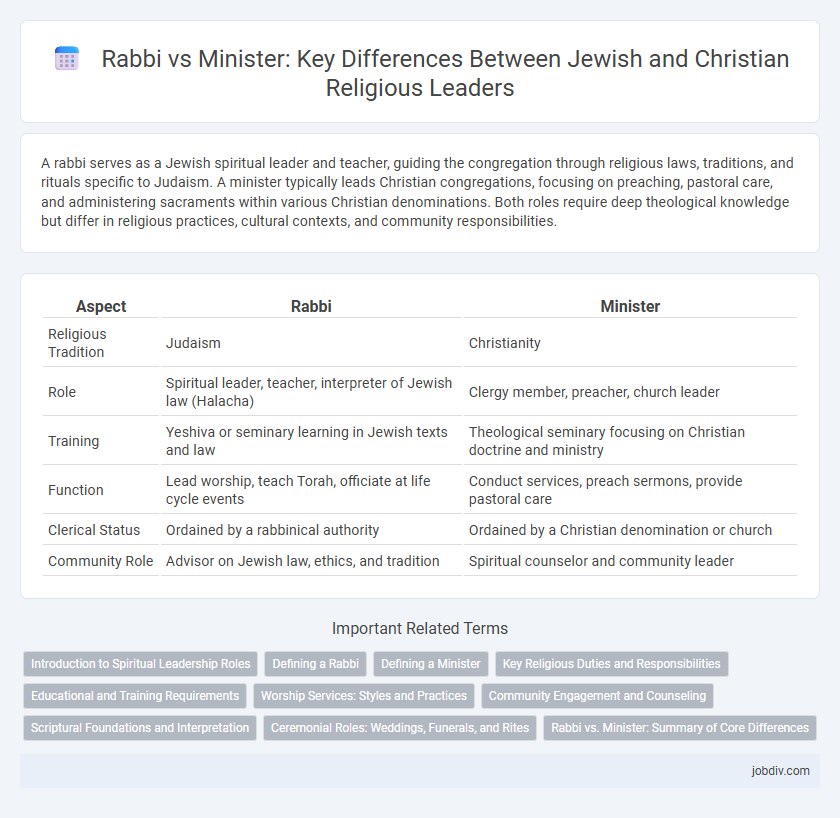A rabbi serves as a Jewish spiritual leader and teacher, guiding the congregation through religious laws, traditions, and rituals specific to Judaism. A minister typically leads Christian congregations, focusing on preaching, pastoral care, and administering sacraments within various Christian denominations. Both roles require deep theological knowledge but differ in religious practices, cultural contexts, and community responsibilities.
Table of Comparison
| Aspect | Rabbi | Minister |
|---|---|---|
| Religious Tradition | Judaism | Christianity |
| Role | Spiritual leader, teacher, interpreter of Jewish law (Halacha) | Clergy member, preacher, church leader |
| Training | Yeshiva or seminary learning in Jewish texts and law | Theological seminary focusing on Christian doctrine and ministry |
| Function | Lead worship, teach Torah, officiate at life cycle events | Conduct services, preach sermons, provide pastoral care |
| Clerical Status | Ordained by a rabbinical authority | Ordained by a Christian denomination or church |
| Community Role | Advisor on Jewish law, ethics, and tradition | Spiritual counselor and community leader |
Introduction to Spiritual Leadership Roles
Rabbi and minister represent distinct spiritual leadership roles within Judaism and Christianity, respectively. A rabbi, grounded in Jewish law and tradition, primarily serves as a teacher and interpreter of the Torah, guiding congregants through religious rituals and ethical living. In contrast, a Christian minister focuses on pastoral care, preaching the Bible, and leading worship services to nurture the faith community.
Defining a Rabbi
A rabbi is a Jewish religious leader and teacher, primarily responsible for interpreting Jewish law, leading worship services, and providing spiritual guidance within the Jewish community. Unlike a minister, whose role varies across Christian denominations and often centers on pastoral care and sermon delivery, a rabbi's authority is deeply rooted in rabbinic scholarship and the study of sacred texts like the Torah and Talmud. Certification as a rabbi typically requires rigorous religious education and ordination from a recognized yeshiva or seminary.
Defining a Minister
A minister is a religious leader authorized to conduct worship services, provide spiritual guidance, and perform sacraments within various Christian denominations. Unlike rabbis, who primarily lead Jewish congregations and interpret Jewish law, ministers often focus on preaching, pastoral care, and administering Christian rites such as baptism and communion. The role of a minister varies across denominations but generally centers on fostering community faith and moral development according to Christian teachings.
Key Religious Duties and Responsibilities
Rabbis primarily provide spiritual leadership in Jewish communities, interpreting Halacha (Jewish law), leading synagogue services, and offering guidance on religious rituals such as kashrut and Shabbat observance. Ministers typically serve Christian congregations, conducting worship services, delivering sermons, administering sacraments like baptism and communion, and offering pastoral care. Both roles include counseling congregants and overseeing religious education, but their duties reflect distinct theological frameworks and liturgical traditions.
Educational and Training Requirements
Rabbis undergo extensive religious education, typically earning a degree from a yeshiva or rabbinical seminary that includes intensive study of the Torah, Talmud, and Jewish law over several years. Ministers usually complete formal theological training at a seminary or divinity school, focusing on biblical studies, pastoral care, and church administration, often earning a Master of Divinity degree. The educational pathways reflect distinct doctrinal traditions and prepare each for roles within their respective faith communities.
Worship Services: Styles and Practices
Rabbi-led worship services in Judaism often emphasize Torah readings, prayers in Hebrew, and community participation, following traditional liturgical structures such as Shacharit or Kabbalat Shabbat. Ministers in Christian worship typically conduct sermons, hymns, and responsive readings grounded in the Bible, with styles varying widely from formal liturgies to contemporary worship music. These distinctions reflect divergent theological traditions and cultural expressions shaping ritual practices and congregational engagement.
Community Engagement and Counseling
Rabbis often provide in-depth Torah-based guidance and personalized pastoral care tailored to Jewish traditions, fostering strong community bonds within synagogues. Ministers typically engage diverse congregations through sermons and counseling rooted in Christian teachings, addressing spiritual and emotional needs. Both roles emphasize compassionate support and active involvement to nurture faith and resilience in their communities.
Scriptural Foundations and Interpretation
Rabbinic leadership roots itself in Torah study and Talmudic interpretation, emphasizing Halakhic authority derived from Mosaic law and prophetic writings. Ministers typically ground their authority in New Testament teachings and pastoral care, drawing interpretative frameworks from Pauline epistles and Gospels. Scriptural foundations influence doctrinal priorities, with rabbis prioritizing mitzvot observance and ministers focusing on salvation and grace theology.
Ceremonial Roles: Weddings, Funerals, and Rites
Rabbis typically lead Jewish weddings, funerals, and rites such as bar and bat mitzvahs, emphasizing traditional Jewish law and customs. Ministers usually officiate Christian ceremonies including weddings, funerals, and baptisms, integrating scripture and liturgy specific to their denomination. Both roles require deep theological knowledge but differ significantly in religious rituals and ceremonial practices.
Rabbi vs. Minister: Summary of Core Differences
Rabbis serve as Jewish religious leaders and scholars who guide Jewish law, traditions, and community practices, while ministers typically lead Christian congregations and focus on preaching and pastoral care. Rabbis undergo extensive religious study, often through yeshivas, emphasizing Torah, Talmud, and Jewish law, whereas ministers are usually ordained through Christian seminaries focusing on biblical theology and church leadership. The roles differ fundamentally in religious texts, rituals, and denominational contexts, highlighting distinctions between Judaism and Christianity.
rabbi vs minister Infographic

 jobdiv.com
jobdiv.com